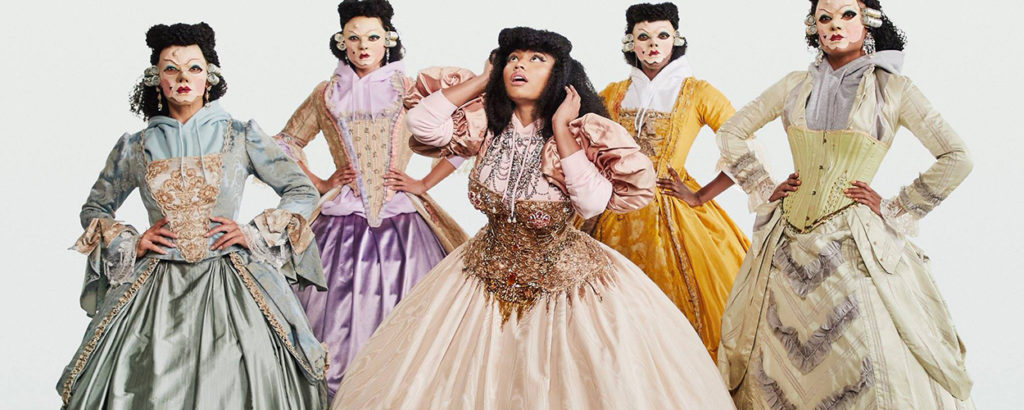This website uses cookies so that we can provide you with the best user experience possible. Cookie information is stored in your browser and performs functions such as recognising you when you return to our website and helping our team to understand which sections of the website you find most interesting and useful.
Business News Legal Top Stories
Nicki Minaj lawyers say Tracy Chapman copyright lawsuit could stifle the creativity of artists
By Chris Cooke | Published on Wednesday 19 August 2020

Legal reps for Nicki Minaj have said that, if the courts find in favour of Tracy Chapman in the two musician’s ongoing copyright dispute, that ruling will have a “significant impact” on the music industry, stifling the creativity of artists.
Chapman sued Minaj in October 2018 over a sample that appears on an unreleased track from the latter called ‘Sorry’. That track was originally intended to feature on Minaj’s album ‘Queen’, but was dropped from the LP at the last minute because her label couldn’t clear a sample of Chapman’s ‘Baby Can I Hold You’.
We knew all this because Minaj had tweeted about the ongoing sample licensing challenges ahead of the release of ‘Queen’. In those tweets she begged the famously anti-sampling Chapman to get in touch, while also asking fans whether she should delay the release of her new record pending the licensing talks, or just release it without ‘Sorry’.
The latter option was taken, although that didn’t stop ‘Sorry’ from getting played on a radio show, allegedly after Minaj’s team leaked it to that radio show’s host. Once it had been aired, fans grabbed the track from the broadcast and starting sharing it online. Resulting in the litigation.
Minaj hit back in her own legal filing last year, raising some issues about the registration of the ‘Baby Can I Hold You’ copyright in the US and pointing out that ‘Sorry’ had only been played on the radio once, so hadn’t made Minaj any money or caused Chapman any real damage. That response also included the customary fair use defence.
The whole dispute continues to go through the motions, with both sides seeking summary judgement in their favour. In new legal filings this week, the Minaj side expand on their fair use claims. Although in doing so, they mainly side-step the issue of how a copy of ‘Sorry’ ended up with a radio station DJ, and instead focus on the creative process that created the track.
Confirming that ‘Sorry’ began as a collaboration with Nas, Minaj’s lawyers say that artists routinely borrow from earlier works when creating music in the studio, and that doing so is fair use. It’s then for the labels and the managers to sort out the licensing paperwork if and when artists decide they want to release a new track that contains elements of those earlier works.
Which is kind of stating the obvious. Why is any of that relevant? Well, because Team Minaj basically argue that if Chapman’s copyright lawsuit is successful, it could set a precedent that copyright is sufficiently powerful to constrain that kind of behind-closed-doors creativity.
According to The Hollywood Reporter, the legal filing from Minaj’s lawyers states: “In the process of creation, no one approaches the original songwriter (the ‘rights-holder’) for a licence to experiment. The musicians just experiment”.
“If something works, and the recording artist wants to release the song commercially, then the record label, managers, and attorneys get involved and seek the required permission”, it goes on. “If it is granted, the recording is commercially released. If permission is denied, the recording is discarded; no one is harmed; and the experimentation begins anew”.
“Recording artists require this freedom to experiment and rights-holders appreciate the protocol as well”, it adds “Often, the rights-holder does not want to simply approve a use in the abstract – ie ‘any hip hop version of your song’. The rights-holder wants to hear the actual version before giving her permission. The plaintiff here, Tracy Chapman, wants to turn this process on its head”.
The logic of that argument is that Chapman’s team are basically saying artists should get permission to play around with earlier works in the studio before doing any playing. But if that happened, says the Minaj side, “creativity would be stifled”.
Which is true. Though, while Chapman’s lawyers do criticise Minaj for both “creating an illegal derivative work” and “distributing that work” in their legal filing, surely the real issue is the latter not the former. Which possibly makes this whole argument something of a distraction.
But, the Minaj side insists, the prospect of Chapman getting summary judgment in her favour “should send a shiver down the spine of those concerned with the entertainment industry”.





